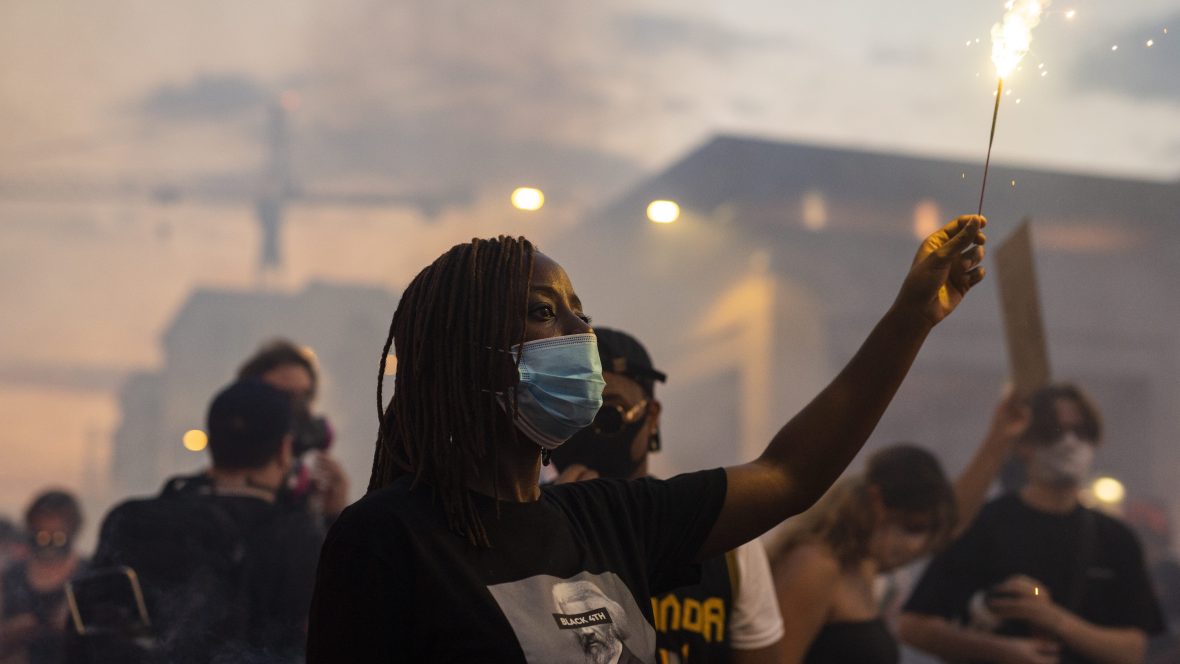What, to Black Americans, is the 4th of July? A day with a history of resistance
Demonstrators light sparklers during the Black 4th protest in downtown on July 4, 2020 in Minneapolis, Minnesota. A number of protest demonstrations occurred around the Twin Cities on Independence Day which were critical of the annual American celebration. (Photo by Stephen Maturen/Getty Images)
The 4th of July may be synonymous with cookouts and fireworks, but since its inception, Black Americans have marked the day with protest.
For Black people, July 4 holds a complicated and largely untold place in American history.
We often hear about the moments in which colonists took steps toward independence. For example, in 1774, the Orangetown [N.Y.] Resolutions protested Britain’s decision to strip power from colonial governments. The small protest proved significant because the resolutions helped shape the Declaration of Independence, approved two years later.
However, independence held a different meaning for then-enslaved Black Americans. The words written by the founding fathers — “all men are created equal” — rang hollow to those shackled, whipped, violated and killed by white plantation owners. These enslaved people were conflicted about proclaiming or feeling love for a country that did not love them back.
In those formative years, many turned July 4 into a movement for their own independence, by either protesting or running to freedom.
As author and educator Derrick R. Spires, an associate professor of literature in English at Cornell University’s College of Arts and Sciences explained to the Cornell Chronicle, “If you’re in the (George) Washington household, your enslaver is the general of the Continental Army. Or if you’re in [James] Madison’s or in [Thomas] Jefferson’s household, your enslaver is penning the Declaration of Independence, and maybe you’re bringing him a glass of water when he’s in Virginia, running through some of those drafts.”
The paradox was not lost on those enslaved, who increasingly found ways to rebel. Their protests and actions caught the attention of Southern plantation owners, who became concerned about the actions of those they considered their property. In his book “Symbols of Freedom: Slavery and Resistance Before the Civil War,” Matthew J. Calvin noted that to quell the impetus for resistance, plantation owners shifted July 4 to a carnival of food and music instead of a celebration of the country filled with patriotic readings. The tradition of July 4th as a day for cookouts and gatherings remains today.
Those readings, with messages filled with hope for all, might’ve given Black Americans the wrong idea. “White men with Black skin, as their friends would have them think, and that all men were born equal and free,” Calvin’s book noted.
However, as the book further notes, Frederick Dalcho, a church historian at the time, more aptly declared that the Fourth of July belonged “exclusively to the white population of the United States.” He further stated that the enslaved “imbibe false notions of their personal rights, and give reality in their minds, to what has no real existence.”
Still, they persisted.
The largest of the Black-led July 4th protests occurred in 1845, when enslaved people revolted over the holiday weekend in Charles County, Md. Two Black men — one enslaved and one free — led a march of 75 enslaved people who attempted to make their way to free territory in Prince George’s County. However, a group of white men on horseback quelled the revolt, wounding and killing some of the protestors.
But it may not have been until 1852 that the struggle of Black people took center stage on Independence Day. That is the day Frederick Douglass asked a simple question — “What to the Slave is the Fourth of July?”
While praising the founders for their courage, he condemned the continued plight of those he represented. “Are the great principles of political freedom and of natural justice, embodied in that Declaration of Independence, extended to us?” he asked. And then, in a great example of oratory, he said:
“The blessings in which you, this day, rejoice, are not enjoyed in common. The rich inheritance of justice, liberty, prosperity, and independence, bequeathed by your fathers, is shared by you, not by me. The sunlight that brought light and healing to you, has brought stripes and death to me. This Fourth [of] July is yours, not mine. You may rejoice, I must mourn.”
Historians rate Douglass’ speech as one of the most important in the pre-Civil War era.
Recommended Stories
This early history of protest continued into the next century and into this one.
On July 4, 1965, Martin Luther King, Jr., during his “American Dream” speech, said: “Now ever since the founding fathers of our nation dreamed this dream in all of its magnificence … America has been something of a schizophrenic personality, tragically divided against herself. On the one hand, we have proudly professed the great principles of democracy, but on the other hand, we have sadly practiced the very opposite of those principles.”
More recently, protests followed the murder of George Floyd, who died at the hands of police on May 25, 2020. On July 4 of that year, several thousand protestors marched across the country demanding justice for Floyd while protesting racism and police treatment of Black people.
Four years later and still in a nation divided against itself, what, to the Black American, is the Fourth of July?
On one hand, Independence Day is a celebration of America’s birth. On the other, it reminds us that “all men are created equal” remains a work in progress.

